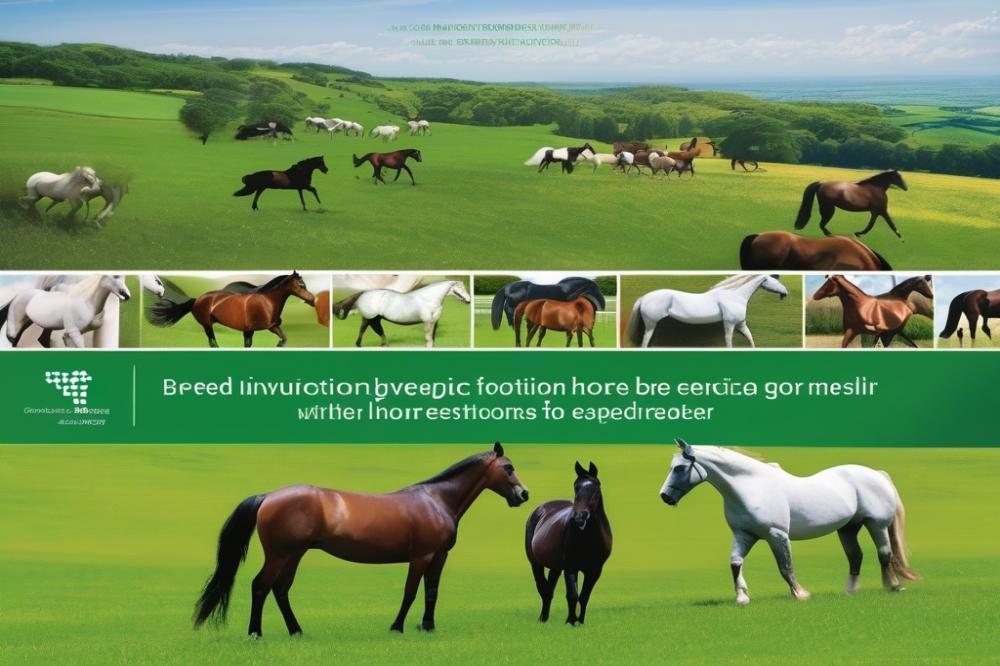Introduction
genetic testing plays a vital role in horse breeding. It allows breeders to understand the traits and characteristics of their horses at a deeper level. With this knowledge, they can make better decisions about which horses to breed together. This process not only promotes healthy offspring but also enhances the chance of producing horses with desired qualities.
The benefits of grasping equine genetics are numerous. Breeders can identify potential health issues before they manifest. Understanding an animal’s lineage helps predict behavior and athletic ability as well. By focusing on these factors, breeders increase the overall quality of their stock. Such insights can lead to significant advancements in the industry.
Innovations in this area are transforming the landscape for horse enthusiasts. Advanced technologies are making it possible to access information that was previously difficult to obtain. Today’s testing methods are quicker and more precise than ever, providing valuable data within days. More affordable options are now available, allowing a wider range of breeders to benefit from these tools. This accessibility supports improved breeding practices and smoothed the path to excellence.
Understanding genetic testing

Genetic testing refers to scientific methods used to analyze DNA in horses. It helps breeders understand various hereditary traits that could affect the health and performance of their animals. Breeders can make informed decisions when selecting horses for breeding by identifying traits associated with specific genes.
DNA testing plays a crucial role in pinpointing hereditary characteristics. Traits such as coat color, speed, or susceptibility to certain diseases can be traced through the horse’s genetics. This information allows breeders to anticipate how these traits might be passed on to offspring, shaping their future generation.
Genetic Markers and Their Significance
Genetic markers serve as indicators of specific traits within a horse’s DNA. These markers can show whether a horse might inherit certain conditions or advantages, guiding breeding choices. For instance, markers linked to athletic ability can help breeders select horses likely to excel in competitions.
Understanding these markers provides insight into the overall breeding program. Having knowledge of how these genes interact can lead to healthier and more competitive horses. Each marker carries vital information that can influence the selection process, making it a key component of effective breeding strategies.
By utilizing this technology, horse breeders take strides toward improving the quality of their breed. Improved selection based on genetic information can lead to stronger, healthier horses that meet specific goals. The integration of genetic testing into breeding practices is transforming the industry, creating opportunities for success.
Advancements in DNA testing Technology

Recent developments have reshaped how horse breeders approach genetic testing. New technologies have pushed the boundaries of understanding equine genetics. High-throughput sequencing has emerged as a prominent method. This technique allows researchers to analyze vast amounts of DNA quickly and accurately.
Overview of Recent Technologies in Genetic Testing
Several methods are now available for genetic analysis. Microarrays have gained popularity for their efficiency in testing various genetic markers. Traditional methods were slower and less reliable. Now, with advanced technologies, breeders can make informed decisions faster than ever.
High-Throughput Sequencing and Its Impact on Equine Genetics
High-throughput sequencing revolutionizes the ability to read genetic material. This innovation provides a comprehensive view of a horse’s DNA. Many breeders appreciate the depth of information this method offers. Understanding the complete genetic makeup can lead to better breeding programs.
How Machine Learning and Bioinformatics Are Enhancing Analysis
Machine learning tools play a significant role in interpreting genetic data. These systems analyze complex patterns within the data. As a result, they help researchers predict traits and health outcomes in horses. Bioinformatics supports these efforts through specialized software. Such tools simplify the task of organizing and understanding vast datasets.
By integrating these technologies, the process becomes smoother. Breeders can now receive insights that were previously impossible. The synergy between biology and technology opens new opportunities. Ultimately, advancements in DNA testing technology mark a new era for equine breeding.
Applications of Genetic Testing in horse breeding

Using Genetic Testing for Bloodline Analysis
Genetic testing can provide valuable insights into a horse’s lineage. Breeders can trace ancestry with greater precision. Additionally, identifying potential champions becomes easier. This kind of information helps make informed breeding choices. Horses with desirable traits can be paired together. Bloodline analysis can also spot genetic diversity. A broad genetic pool is essential for overall health. It reduces the likelihood of inherited disorders. By understanding bloodlines, breeders can avoid repeating less favorable genetic traits. This practice improves the quality of future generations.
Importance of Disease Prevention Through Genetic Insights
Preventing diseases is a key focus for many breeders. Genetic insights can reveal susceptibility to specific health issues. Armed with this information, breeders can take proactive measures. Selecting mates without certain genetic markers decreases disease risks. This proactive approach leads to healthier horses. Testing can highlight genetic conditions that may not show symptoms. Early detection can save considerable time and resources. Additionally, breed improvement is another benefit. Enhancing health standards helps increase the breed’s overall value. By prioritizing genetic health, breeders contribute to stronger equine populations.
Role of Testing in Performance Enhancement and Tracking Potential
Performance is often a priority in horse breeding. Genetic analysis assists in identifying traits that predict success. For instance, certain markers can indicate speed or stamina. By knowing this, trainers can select horses with optimal potential. Tracking performance indicators helps gauge improvement. Furthermore, specific gene variations can signal adaptability to different disciplines. Breeders can make choices that align with their goals. Some may focus on racing, while others might prefer show jumping. Understanding genetic potential aids in nurturing talent effectively. This focused approach benefits both horse and rider.
Enhancing Genetic Diversity
Genetic diversity is crucial for the health and well-being of horses. A diverse gene pool allows for stronger immune systems and better adaptability. When horses are genetically varied, they are less prone to diseases. Breeders should prioritize this aspect to increase the overall vigor of their horses.
Maintaining genetic diversity requires informed decisions. Breeders can use genetic information to identify the unique traits in their horses. This knowledge helps in selecting breeding pairs that complement each other rather than amplifying the same traits. By doing so, they can avoid the pitfalls of inbreeding.
Strategies for Breeders to Maintain Diversity
Several strategies exist for breeders aiming to sustain genetic diversity. One effective method involves keeping thorough records of horse lineage. Understanding family trees makes it easier to detect relatedness among animals. Breeders can also seek out new bloodlines to introduce fresh genes into their breeding programs.
Additionally, collaborating with other breeders can provide access to a broader range of genetic material. This type of sharing can facilitate the rotation of stallions and mares, which is beneficial for increasing diversity. Adopting a collaborative approach can lead to more successful breeding outcomes.
Impact of Genetic Testing on Managing Inbreeding
The implementation of advanced testing techniques helps breeders manage inbreeding effectively. Assessing the genetic makeup of horses reveals their degree of relatedness. Such information helps to identify potential health risks before they arise. Breeders can then make educated choices that decrease the likelihood of health problems linked to inbreeding.
Moreover, understanding the genetics involved allows breeders to select mates that enhance the qualities they desire, without repeating the same traits over and over. This targeted approach is vital for producing horses that excel in performance and health. A well-informed breeding strategy is key to fostering a resilient equine population.
Case Studies and Practical Insights
Successful breeding programs have adopted testing methods to improve horse lineage. Breeders are now gaining significant advantages by tapping into advanced science. These programs highlight a shift in how horses are matched for breeding. The outcomes can lead to producing offspring with desired traits.
For instance, one breeder utilized tests to identify genetic markers linked to racing performance. This allowed for selecting mares and stallions with the best potential. Enhanced speed or stamina became quantifiable traits. Breeders reported faster foal growth rates and better overall health after implementing these measures.
Real-world applications are expanding. One horse farm in Kentucky has integrated genetic assessments into its routine. The team found it helpful in making decisions about which horses to retire from breeding. Data-driven choices reduced the risk of passing on undesirable traits.
Success stories are emerging from various regions. Some training facilities have also benefited from insights into genetic predispositions. Understanding a horse’s lineage has helped trainers tailor specific training regimens. More horses are reaching their potential earlier that way.
Potential challenges arise as well. Not all breeders understand the complexity of data interpretation. Misinterpretations can lead to poor breeding choices. Some might overestimate the importance of genetic results, ignoring environmental factors. Moreover, costs associated with testing can be prohibitive for smaller operations.
Fears about data privacy also concern some breeders. There is always a risk of sensitive information being misused. Maintaining confidentiality must be a priority for anyone involved in breeding programs. Guidance is critical to navigating this new territory successfully.
Future Trends in Genetic Testing for Breeders
Emerging technologies and their potential impacts
New tools in genetic analysis are changing the way horse breeding is approached. Developments in artificial intelligence can analyze vast amounts of data quickly. This technology helps breeders identify desirable traits more efficiently. Additionally, CRISPR gene-editing shows promise for enhancing certain qualities in horses. Breeders can address hereditary issues in a more targeted manner. Advancements in sequencing technologies are also on the rise. These innovations could lead to cheaper and faster testing options.
Predictions for the future of genetic testing in equine breeding
Experts believe that genetic markers will play a major role in breeding decisions. By assessing a horse’s genetic profile, breeders might predict performance in competitions, health issues, and temperament. The use of big data could transform the entire breeding process. Breeders will likely rely on detailed reports to make informed choices. As testing becomes more accurate, horse enthusiasts may begin to focus on breeding traits that support longevity and wellness. In addition, sharing genetic data within the industry could foster collaboration among breeders. Greater transparency might emerge as individuals seek to uphold standards in breed qualities.
Ethical considerations and responsible breeding practices
As technology advances, ethical concerns come to the forefront. It is crucial to weigh the consequences of using such advanced tests. Responsible breeding should prioritize the health and well-being of horses. Avoiding over-selection for specific traits can prevent potential health problems. Breeders must stay aware of possible genetic disorders exacerbated by selective breeding practices. Additionally, it becomes important to educate oneself about the limitations of genetic testing. Not all traits can be traced back to genetics alone. It is essential that breeders practice sound judgment and consider the entire horse as a living being, not just a set of genes.
Final Thoughts on Innovation in Equine Breeding
Genetic testing has revolutionized the world of horse breeding. Understanding equine genetics allows breeders to make informed decisions. These advancements lead to healthier foals and improved bloodlines. Breeders now have tools to detect genetic disorders early. This proactive approach can save time, money, and heartache.
Looking to the future, technology will continue to shape breeding practices. As more research emerges, the potential for tailored breeding will grow. With DNA testing, breeders can assess traits linked to performance, health, and temperament. This knowledge paves the way for selecting horses with the best possible attributes. As a result, the industry might see noteworthy improvements in race outcomes and overall horse quality.
Embracing these scientific methods requires an open mindset. Changes can be daunting, but the benefits far outweigh the challenges. By integrating innovative practices, breeders open doors to success. The breeding community must invest in these advanced tools for better results. The horse industry stands to gain immensely from such dedication.
In conclusion, the realm of equine breeding is on the brink of transformation. Genetic insights offer boundless possibilities, from enhanced health to optimized performance. Breeders should not hesitate to adopt these advancements. The future of horse breeding depends on willingness to innovate and adapt.



